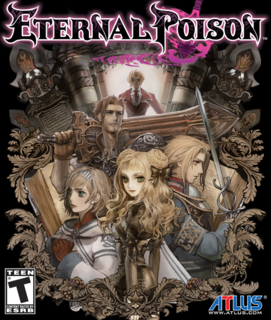A nice cap to Atlus' amazing strategy RPG run on the PS2
Two virtues stand out about Eternal Poison. Unlike Disgaea, it is not a time sink. The game is structured around one mythology, but three rotating stories. When you begin, you choose a narrative thread, and that's your story for the game. Second, the game foregoes level grinding. In fact, you couldn't grind if you tried, and this turns out to present a significant strategic challenge.
The most important aspect of any SRPG is its battle system and the strategy its mechanics open up. The game progresses through tiers of a dungeon. The progression is rather linear but you do have the opportunity to veer off on a number of limited paths. There are two neat things about this. First, you will run into the characters from the other narrative threads thus giving you some insight into the larger conflict of which you are a part. Second, you will free certain characters that you will then speak with back in town, who may provide you with bonus items.
As you progress through the game, characters will loiter about the hub town and offer their services to you. This is nice in theory, but because there is no opportunity to level grind you will find yourself needing to make decisions rather early as to who will be active in your party, for the later maps get tough and lower level characters will only make it all the way through the battle by the grace of excellent strategy, and trust me, you willl need your whole team.
A few things make battle in Eternal Poison a standout. Again, because you can't grind, you must pay very close attention to your stats and abilities. Because every map has enemies one or two levels above you, and because the strengths of weaknesses of enemies are fully represented on every map, you must send only the correctly matched opposing strength if you hope to make it through a map. It was on this count that I found EP most enjoyable - in other games, you are always tempted to simply grind a level or two and then clear off the map.
Second, the ability to capture monsters is nice. By performing an overkill you dominate the monster. When you revisit the town, you can choose to either add it to your team, cash it in for money, or extract a skill from it. Usually, the best option is to extract the skill since not all of these are available for purchase or occur naturally in leveling up. Although it's nice to have the option to add them to your squad, the game provides enough characters, and each story is short enough to make this much less valuable than it initially sounds.
Last, maps are fairly large with enemies split into 2, 3, or 4 groups against your one. This usually means that you need to decide not only how to split your group up but which enemies to take our first. Unfortunately, this requires a bit of trial and error, but beating a map is rewarding.
There are some disappointing aspects to Eternal Poison. Because it is linear and provides for no level grinding, the experience is over just when you are getting good at the game. Also, it is apparent that the game was produced on a slim budget. The music actually uses tracks from Persona 3 (the track that plays when you're back at the dorm) and the in game models are mediocre at best. Additionally, the town is merely a collection of rooms that offers no additional life or sense of the world Eternal Poison is a part of.
In the end, Eternal Poison is a better than good strategy game. In some ways, given the obvious limitations, it is startlingly well crafted. Nonetheless, it is unlikely to convert first time SRPG players. But, for the rest of us, it provides a quality and challenging way to spend at least 12-15 hours of our gaming time, and possibly a decent reason to spend much more than that. It is unfortunate the game has come out so late in the PS2 life cycle for it could have anticiapted the kind of attention that would have justified a larger production budget. Nonetheless, it is a great way to cap off the PS2 SRPG legacy.

